The challenge that sparked collaboration
Enabling the community
A group of collaborators from University of Costa Rica (UCR), the CABANAnet consortium, and us at EMBL’s European Bioinformatics Institute (EMBL-EBI) recognised a persistent challenge in global bioscience: many Latin American researchers are being left behind in the AI revolution transforming their field.
Together, we’ve launched a new partnership, BiotrAIn, to engage researchers directly in developing solutions and establishing a sustainable community for lasting impact.
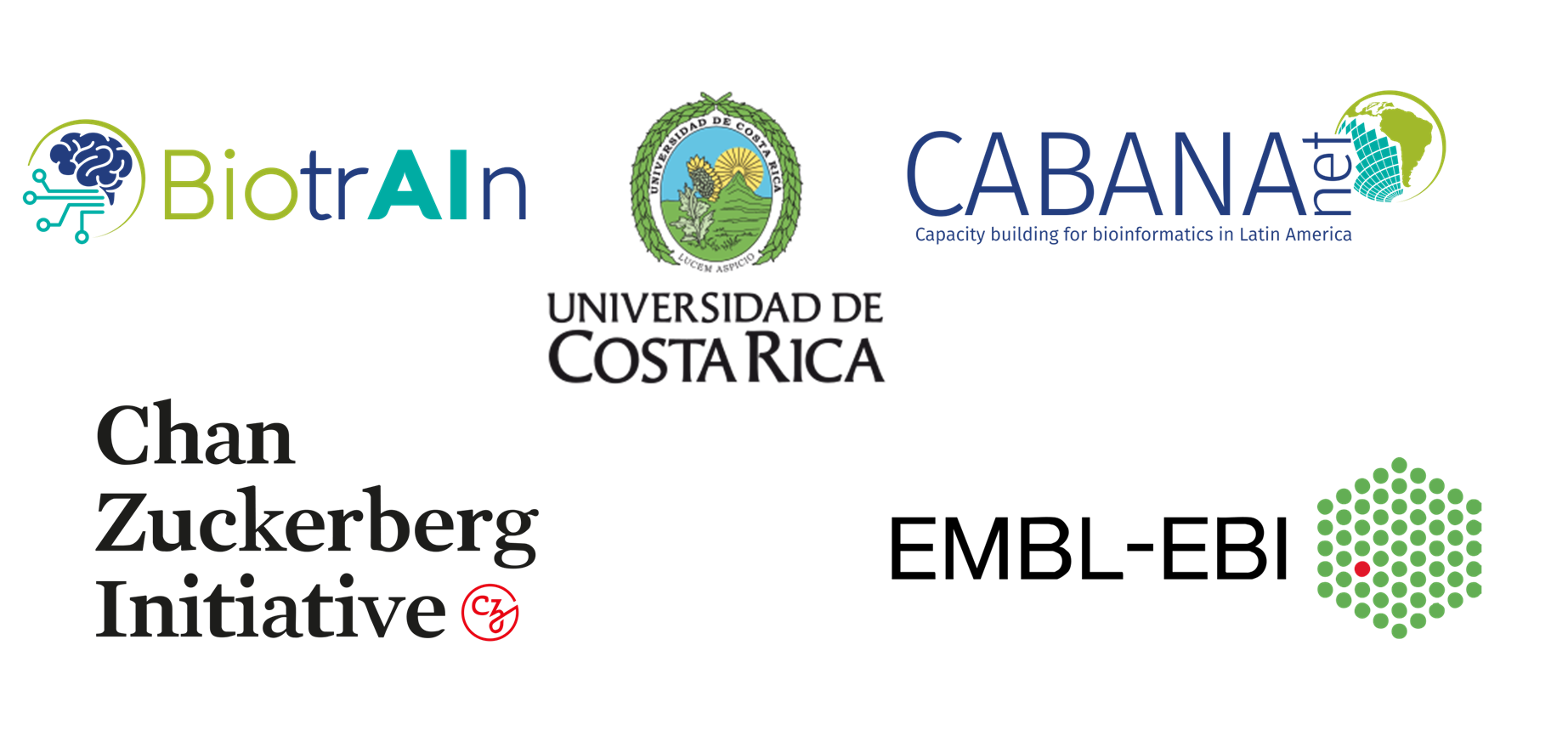
BiotrAIn consortium logos: BiotrAIn, Universidad de Costa Rica, CABANAnet, EMBL-EBI and Chan Zuckerberg Initiative.
The vision was clear: enable Latin America to participate as an equal partner in globally important bioscience projects that use or develop artificial intelligence methods to solve biological and biomedical problems better.
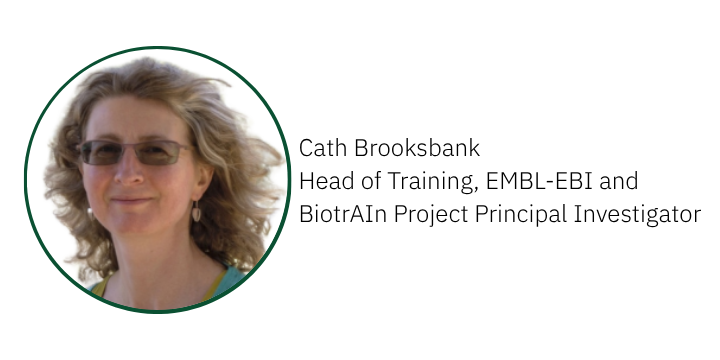
“I was fortunate to get to know Rebeca and Jose when they took up secondment places on the CABANA project, a five-year project to strengthen biodata science capacity across Latin America. With Jose’s machine learning expertise and Rebeca’s leadership of CABANAnet (the successor to CABANA), they were the dream team to work with on our plans to strengthen AI education and training for researchers in the region.”
Cath Brooksbank, Head of Training, EMBL-EBI and BiotrAIn Project Principal Investigator.
Building the BiotrAIn community
The BiotrAIn project, supported by the Chan Zuckerberg Initiative, positions Latin American researchers as co-creators of their own educational future – the only way to achieve genuine equal partnership in global AI-driven bioscience. A virtual knowledge exchange meeting (KEM) brought together Latin American bioscientists to identify their own challenges and bottlenecks in incorporating AI into their work. Researchers shared specific needs, infrastructure realities, and unique opportunities that no external assessment could have captured.
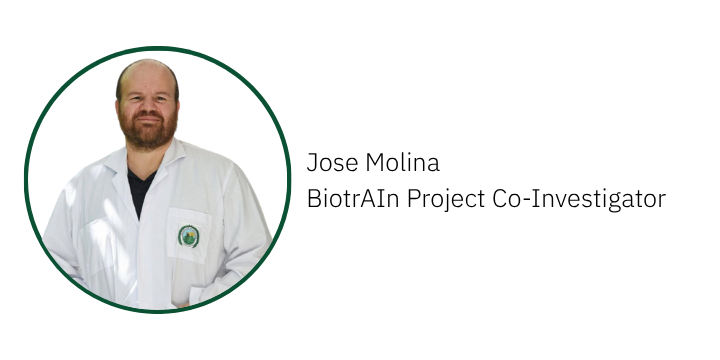
“The experience of the KEM was truly enriching. We were able to connect with colleagues and institutions, share common challenges, and explore opportunities for collaboration. With the support of the CZI and leadership of EMBL-EBI, we are strengthening our capacities to contribute through our diversity and expertise, promoting an equitable and shared development of disruptive technologies such as artificial intelligence.”
Jose Molina, UCR, BiotrAIn Project Co-Investigator.
Secondments and hands-on course development
Building on community discussion, the UCR, CABANAnet, and EMBL-EBI collaboration launched a secondment programme. Through funded three-month positions (March – June 2025), doctoral students, postdocs, and researchers from across Latin America joined development teams to create training resources on AI for the biosciences.
These weren’t passive trainees – they were active developers, building the materials that would train their peers, an enriching experience where every secondee was paired with a mentor.
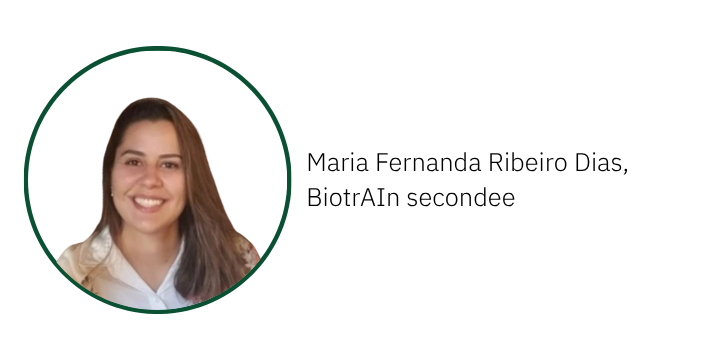
“It was an incredible experience to be part of the organisation of the BiotrAIn course. Although I have been working with machine learning methodologies since my master’s degree, this was the first time I helped organise an international course. The development of the material, together with Cath’s team, contributed significantly to my professional growth. The meetings I had with Giorgia, Alex, and Mallory provided me with valuable insights into data usage, ethical and environmental issues, and allowed me to closely follow the organisation and functioning of the EMBL-EBI research groups”.
Maria Fernanda Ribeiro Dias, BiotrAIn secondee.
Following the successful launch of the BiotrAIn pilot course in June 2025, Participants didn’t just acquire technical AI skills – they built lasting networks across institutions and countries, creating the foundation for sustained regional capacity building.
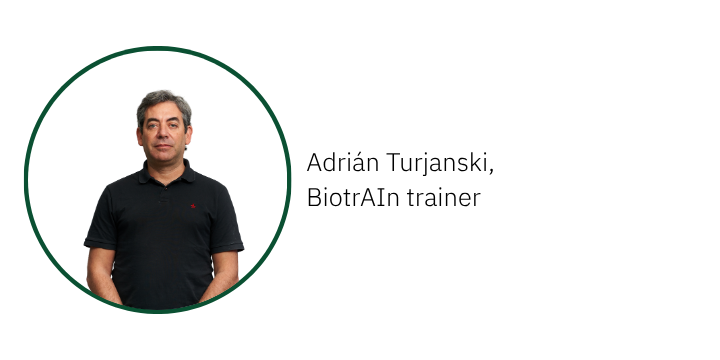
“BiotrAIn stood out because it united students from across Latin America around shared, hands-on challenges. As a trainer, I loved that our lecture covered the foundations of AI deep learning and then put them into practice with AlphaFold – an uncommon but urgently needed pairing to bring AI into biology curricula.”
Adrián Turjanski, BiotrAIn trainer
Scaling through community: the hub and spokes model
Building on the BiotrAIn pilot course success, the community is now leading BiotrAIn’s evolution, delivering the course in a hub-and-spoke model across Latin America.

Join the initiative at one of the sites in Latin America below, between 20 – 24 April 2026.
The course on AI for the biosciences is in-person and will take place simultaneously at the following sites:
- University of Buenos Aires (FCEN-UBA), Argentina
- CIFASIS-CONICET/UNR, Rosario, Argentina
- Aggeu Magalhães Institute / Fiocruz Pernambuco, Brazil
- ENES Unidad León, National Autonomous University of Mexico, León, Guanajuato, Mexico
- Universidad de Antioquia, Medellín, Colombia
- University Andres Bello, Santiago, Chile
- University of Costa Rica, San José, Costa Rica
Deadline to apply is 28 November 2025, 23:59 (UTC-6).
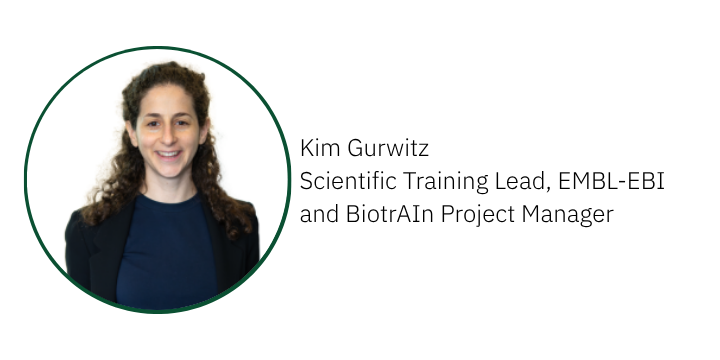
“Using a Hub and Spokes model allows us to share resources more efficiently and build a connected community of bioscientists exploring AI across the region. The central hub provides structure and support, while the spokes create local points of engagement where participants can learn, collaborate, and apply AI tools in context, fostering a shared learning ecosystem. We welcome applications to join a classroom and join the community!”
Kim Gurwitz, Scientific Training Lead (Grants Programme), EMBL-EBI; BiotrAIn Project Manager.
The lesson extends beyond this initiative: when established institutions collaborate with communities as equals, transformative change becomes possible. The future of addressing scientific disparities isn’t about what institutions build for communities – it’s about what they build together.
This project has been made possible in part by a grant from the Chan Zuckerberg Initiative DAF, an advised fund of Silicon Valley Community Foundation.
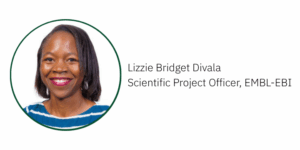
Blog post authored by: Lizzie Bridget Divala, Scientific Project Officer, EMBL-EBI and edited by Rebecca Nicholl, Marketing and Communications Manager, EMBL-EBI